Why Skin Care Matters at Every Stage of Life
Taking care of your skin isn’t just for adults. In fact, it’s important to start young, as good skincare habits can have long-lasting effects. From the soft and delicate skin of babies and children to the more mature needs of adults, skincare should evolve with you.
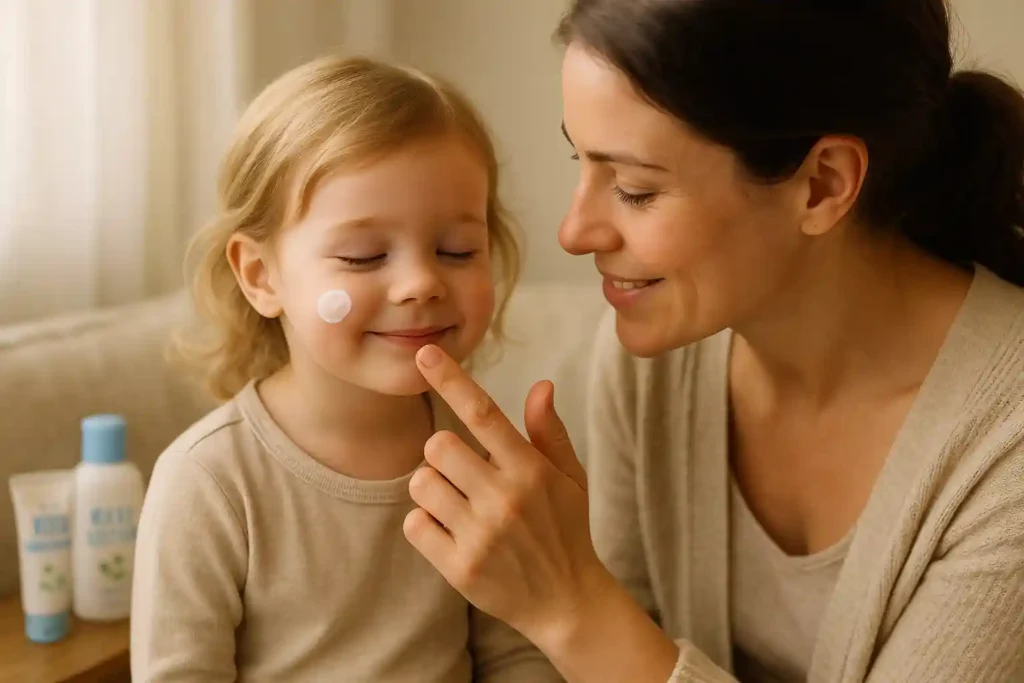
As we grow older, our skin changes. What works for a 10-year-old won’t necessarily be the best for someone in their 30s or 40s. That’s why understanding how skincare differs at each stage of life can lead to healthier skin, now and in the future.
For example, children’s skin is thinner and more sensitive than adults. Their skin is more prone to dryness and irritation, especially because of environmental factors like sun exposure, pollution, and even certain fabrics. On the other hand, adult skin might deal with fine lines, wrinkles, and sunspots from years of exposure.
Skin Care for Kids vs. Adults
When it comes to skin care for kids, the focus is all about gentleness. Children’s skin, especially in their early years, is still developing. It needs products that hydrate without irritation.
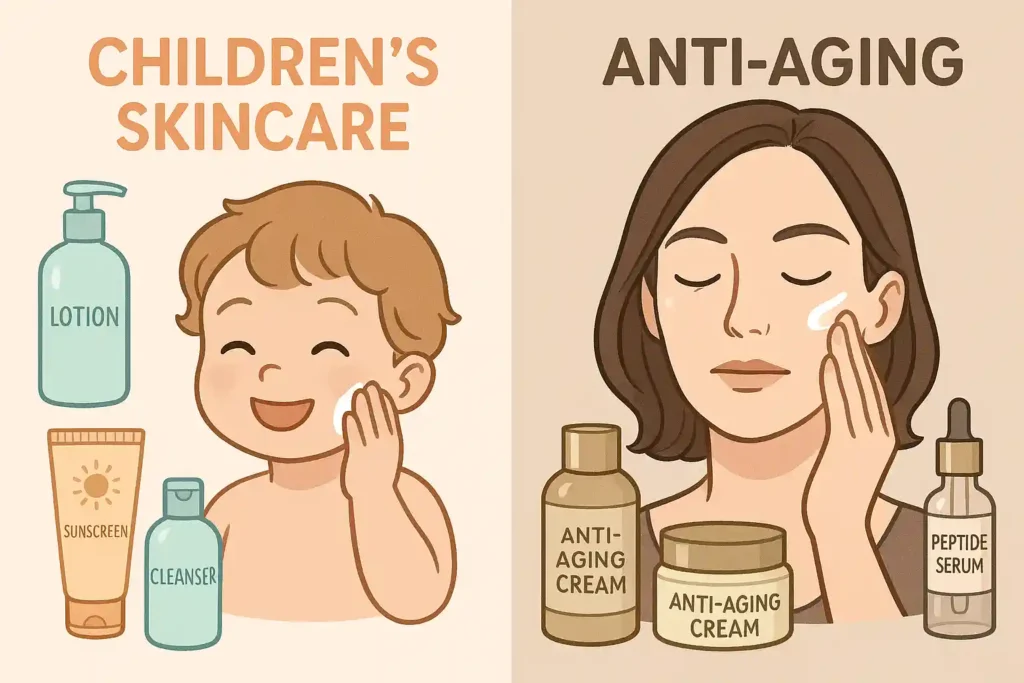
At this stage, things like harsh chemicals, fragrances, or intense exfoliators should be avoided. Think of simple, gentle products like moisturizing lotions and sunscreens designed specifically for young skin.
Adults, on the other hand, need to think about preserving skin health and preventing the signs of aging. That’s where things like an anti aging skin care routine come into play.
For instance, as we get older, the skin produces less collagen and elastin, which leads to wrinkles and sagging.
That’s why including products like skin care products containing peptides, which stimulate collagen production, can be a game-changer.
A Sneak Peek of What’s to Come
In this guide, we’ll walk you through the best skin care for kids, clarify what is a skin care toner, talk about the benefits of skin care products containing peptides, and break down an effective anti aging skin care routine.
We’ll also introduce you to dermatologist developed skin care products, which are designed to ensure your skin gets the safest and most effective care possible.
Stay with me as we dive deeper into the specific needs of your skin at every age. From gentle baby lotions to advanced anti-aging serums, we’ve got it all covered.
The Importance of Skin Care for Kids: Starting Healthy Habits Early

Taking care of your skin is a lifelong journey, and it’s never too early to start! When it comes to skin care for kids, the right habits and products can go a long way in keeping their skin healthy and safe.
As a parent or caregiver, you might wonder why it’s important to care for children’s skin from such a young age. Well, let me tell you, it’s all about prevention, protection, and healthy growth. Kids’ skin is delicate, thinner, and much more sensitive than adult skin.
It’s more prone to dryness, irritation, and even sun damage. But the good news is, teaching kids good skincare habits from an early age can help prevent these issues and set them up for a lifetime of healthy skin.
Why Skin Care for Kids Is So Important
As children grow, their skin is constantly changing. Baby skin, for example, is incredibly sensitive and needs products that are mild and free from harsh chemicals.
Skincare at this stage should focus on hydration and protection, particularly from the sun’s harmful rays. Sunburns and irritation at this stage can lead to problems later on in life, like premature aging or even skin cancer.
Teaching children how to care for their skin, like applying sunscreen every day, even when they’re indoors, can protect them in the long run. Starting early with skin care for kids helps them develop lifelong habits that keep their skin safe and strong.
Best Skin Care Products for Kids (10-12 Years Old)
Now, let’s talk about what products are safe and effective for kids, especially as they hit the age of 10 to 12 years old.
At this age, children start to have different skincare needs. They’re more active, they’re outside a lot, and they might start experiencing things like dry skin or the early signs of acne.
Here’s a list of some of the best skincare products for kids in this age group:
- Gentle Face Washes – A mild face wash that doesn’t strip the skin of natural oils is perfect for kids. Look for ones that are free of fragrances and harsh chemicals.
- Moisturizing Lotions – Kids need moisture to keep their skin soft and hydrated. Choose a light, non-greasy lotion that absorbs quickly.
- Sunscreen – The best sunscreen for kids is one that’s broad-spectrum, SPF 30 or higher, and water-resistant. It protects their skin from both UVA and UVB rays.
These products help ensure their skin stays clean, moisturized, and protected from the sun. Always look for gentle, dermatologist developed skin care products, as they’re specifically designed with sensitive skin in mind.
Skin Care Routine for 10-12 Year Olds
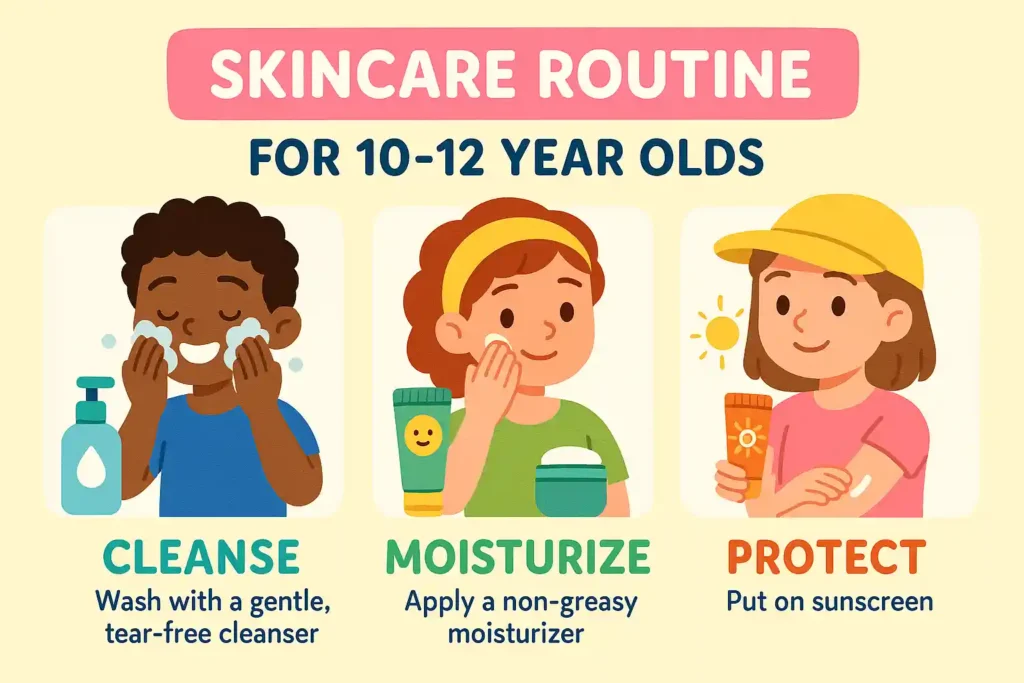
So, how should a typical skincare routine look for children between 10 and 12 years old? It doesn’t have to be complicated! Here’s a simple routine to follow:
- Cleanse – Wash the face with a mild, tear-free cleanser to get rid of dirt, oil, and sweat. This should be done every morning and night.
- Moisturize – Apply a gentle, non-greasy moisturizer to keep the skin soft and smooth.
- Protect – Sunscreen should be applied every morning, even on cloudy days. Kids are often outside for sports or play, so it’s essential to protect their skin from harmful UV rays.
This routine is easy for them to follow and is perfect for maintaining healthy skin as they grow.
What is a Skin Care Toner and Why Should You Use It?
You’ve probably heard about skin care toners, but do you really know what they are or how they can benefit your skin? Let’s clear up some common misconceptions and talk about how toners can be a great addition to your routine, no matter your age.
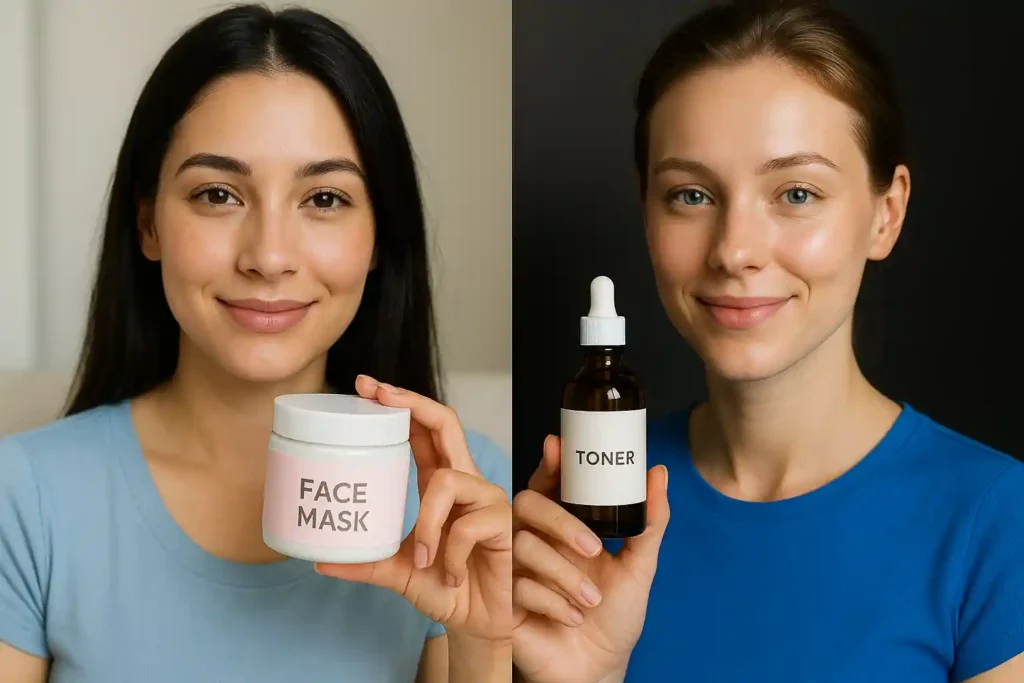
Debunking the Myths: Toners Are Not Just for Oily Skin
For many years, toners got a bad reputation for being harsh and drying. People thought they were only for those with oily skin, and often, these products were packed with alcohol, which could strip the skin of its natural oils.
But the truth is, modern toners have evolved. They’re now gentle and can offer a range of benefits to all skin types, from oily to dry and everything in between.
So, what is a skin care toner? Simply put, a toner is a liquid skincare product that you apply after cleansing. It helps to balance your skin’s pH, remove any leftover dirt or makeup, and prep your skin for the next steps in your skincare routine, like moisturizer or serums.
The Benefits of a Skin Care Toner
Toners today are packed with beneficial ingredients that hydrate, soothe, and even target specific skin concerns. For example, many toners now contain:
- Hydrating Ingredients like aloe vera and glycerin, which help your skin retain moisture.
- Calming Ingredients like chamomile and rose water, which can calm irritated or sensitive skin.
- Exfoliating Ingredients like witch hazel or AHAs (Alpha Hydroxy Acids), which gently exfoliate and remove dead skin cells.
These ingredients work together to keep your skin healthy and balanced.
How to Choose the Right Toner for Your Skin
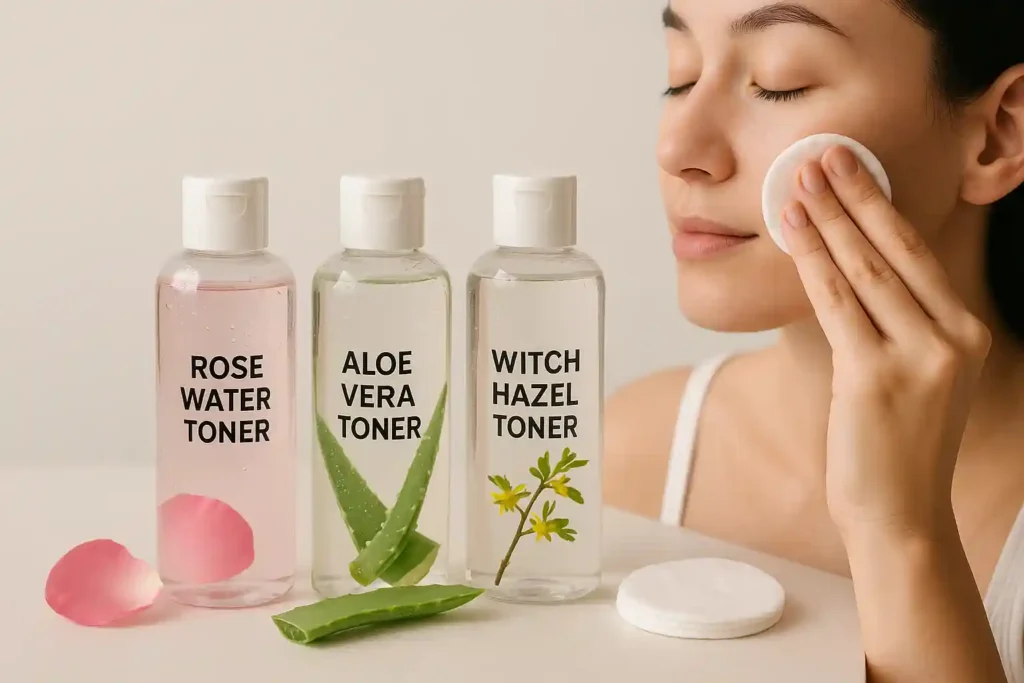
Now that we know what is a skin care toner, you might be wondering how to choose the right one. There are so many options out there, but the key is to find a toner that matches your skin type.
- For Oily Skin: Look for toners with ingredients like witch hazel or salicylic acid, which help control oil and reduce breakouts.
- For Dry Skin: Choose toners that are alcohol-free and include hydrating ingredients like glycerin or hyaluronic acid. These will hydrate and refresh without stripping moisture.
- For Sensitive Skin: Opt for soothing toners with chamomile, aloe, or rose water. These ingredients are gentle and calming on sensitive skin.
When shopping for a toner, check the product labels for words like “alcohol-free,” “hydrating,” or “soothing,” especially if you have sensitive or dry skin.
Toner for Kids: Is It Necessary?
When it comes to skin care for kids, toners aren’t typically needed. Children have delicate skin, and their skincare routine should focus on hydration and protection rather than exfoliation or balancing pH.
That said, as your child enters their teenage years, you may notice they start experiencing some of the common skin challenges of adolescence, like acne or oily skin. At this point, toners can be useful, but it’s important to choose gentle, alcohol-free formulas.
Toners can help with things like:
- Controlling Oil – For teens with oily skin, toners can help reduce shine and balance oil production.
- Preventing Breakouts – Certain toners can help prevent acne by removing excess oils and impurities that can clog pores.
But remember, always choose a dermatologist developed skin care product to ensure it’s safe for younger skin.
Unlocking the Power of Peptides in Skin Care
You might have heard the term “peptides” tossed around in the world of skin care, but what exactly are they and why should you care? Let’s break it down simply.
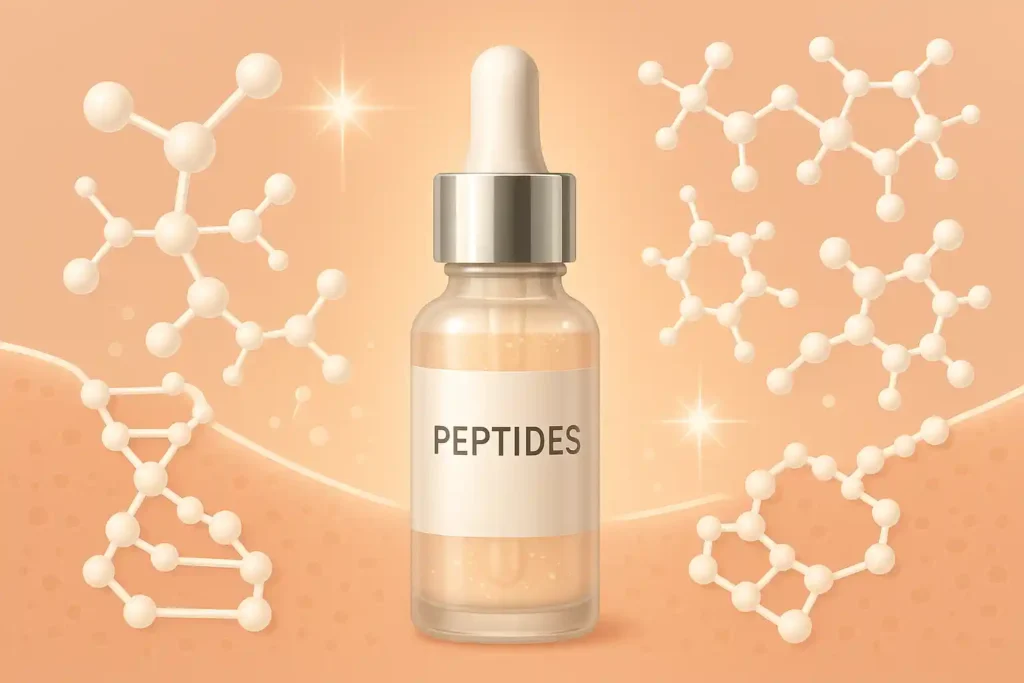
Peptides are tiny chains of amino acids that play a key role in maintaining the health and appearance of your skin.
They are often called the “building blocks” of proteins, which are essential for strong, healthy skin. But how do they actually help your skin?
What Are Peptides and How Do They Help Skin?
Peptides are essential for stimulating collagen production in the skin. Collagen is a protein that gives skin its structure, strength, and elasticity.
As we age, our collagen production slows down, which leads to wrinkles, fine lines, and sagging skin. That’s where peptides come in!
When applied topically, skin care products containing peptides can help boost collagen production, improve skin texture, and reduce signs of aging.
Think of them as little messengers that tell your skin to produce more of the good stuff, like collagen and elastin, helping to keep your skin firm, smooth, and youthful-looking.
For example, if you’re noticing fine lines around your eyes or sagging skin along your jawline, a peptide-infused serum or cream can work wonders. It encourages your skin to bounce back, giving it a more plump and rejuvenated appearance.
Peptides in Anti-Aging Skin Care Routine
As you build your anti aging skin care routine, peptides are a must-have. They’re especially helpful for those looking to target common signs of aging like wrinkles, sagging, and dullness.
Here’s how you can incorporate peptides into your routine:
- Serums: Peptide-based serums are lightweight and packed with active ingredients. They’re designed to penetrate deep into the skin to stimulate collagen production.
- Moisturizers: Some moisturizers are formulated with peptides to hydrate the skin while also working on improving its elasticity.
- Eye Creams: The skin around your eyes is delicate and often shows the first signs of aging. Peptides in eye creams help to reduce puffiness, dark circles, and fine lines.
By adding a peptide product to your routine, you’re helping to rebuild the skin’s support structure, making it look firmer and smoother.
How to Incorporate Peptides into Your Routine
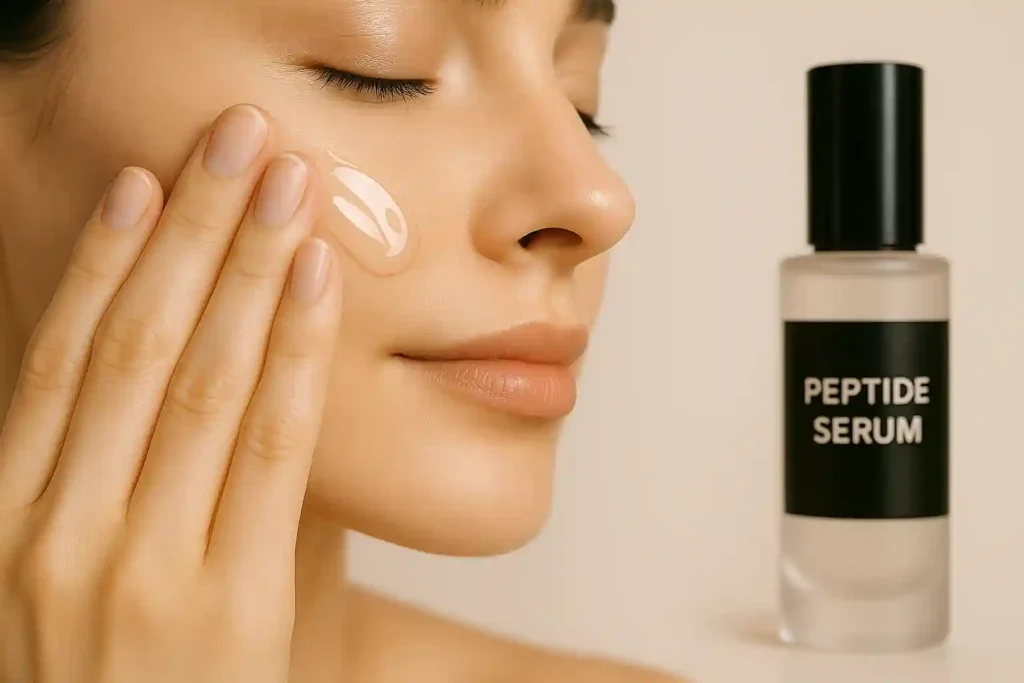
If you’re wondering how to use peptides in your daily skincare, here’s a simple step-by-step guide:
- Cleanse Your Skin: Start with a gentle cleanser to remove dirt and impurities.
- Apply a Toner: If you’re using a toner, apply it before your peptides to balance your skin’s pH.
- Peptide Serum: Next, apply your peptide serum. Serums are usually lighter and absorb quickly, making them perfect for targeting specific skin concerns.
- Moisturize: Finish up with a moisturizer to lock in all the hydration and goodness from the serum.
For best results, use your peptide products in both your morning and night routines.
Incorporating peptides into your skin care routine can help you achieve a more youthful and glowing complexion.
Whether you’re looking to reduce the appearance of fine lines or simply want to maintain healthy, firm skin, peptides are a powerful ingredient to include in your daily regimen. Start using them today and let your skin feel the difference!
Building the Perfect Anti-Aging Skin Care Routine
Aging is a natural part of life, but that doesn’t mean you can’t take steps to keep your skin looking youthful and radiant. A well-rounded anti aging skin care routine can help reduce fine lines, wrinkles, and sagging, while keeping your skin glowing and healthy.
So, what goes into an effective anti-aging routine? Let’s break it down in simple terms.
Key Components of an Anti-Aging Routine
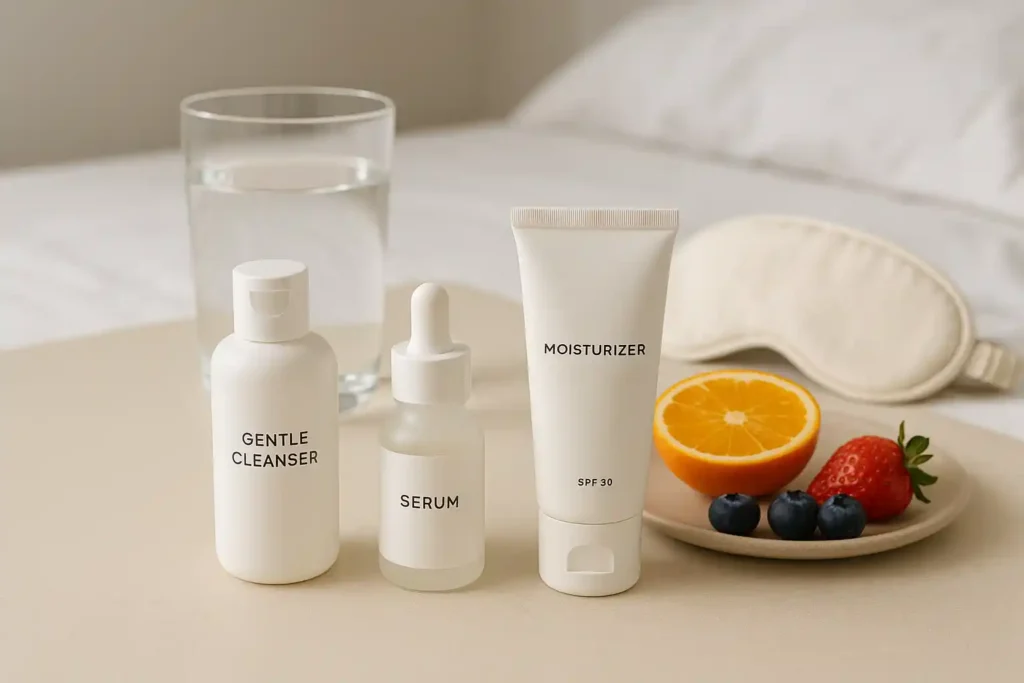
An effective anti-aging routine doesn’t need to be complicated. The key is to focus on the right ingredients that work together to keep your skin firm, smooth, and hydrated. Here are the main components you’ll need:
Cleansing – Always start with a gentle cleanser to remove dirt, oil, and makeup. Look for a cleanser that won’t strip your skin of its natural oils but still leaves your face clean.
Toner – After cleansing, a toner can help balance your skin’s pH. It prepares your skin for the next steps in your routine and can hydrate or soothe if needed.
If you’re unsure of what is a skin care toner, it’s simply a liquid that refreshes the skin and tightens pores. It’s great for prepping the skin for serums and moisturizers.
Serums with Active Ingredients – This is where the magic happens! Anti-aging serums contain active ingredients like skin care products containing peptides, vitamin C, and retinol.
These ingredients target the signs of aging and work on a deeper level to smooth out fine lines, fade dark spots, and improve skin texture.
Moisturizer – A good moisturizer helps lock in all the benefits of your previous steps, keeping your skin hydrated and plump. Look for a moisturizer that is rich but not greasy, with ingredients like hyaluronic acid and ceramides to boost moisture retention.
Sunscreen – Protecting your skin from harmful UV rays is one of the most important steps in any anti-aging routine. Sunscreen helps prevent sun damage, which is one of the main causes of premature aging. Always choose a broad-spectrum sunscreen with at least SPF 30.
By following these steps, you’re giving your skin the best chance to stay youthful and healthy for longer.
Best Anti-Aging Products and Ingredients
So, what should you look for when picking anti-aging products? There are a few ingredients you’ll want to focus on for maximum results:
- Peptides – These are essential in skin care products containing peptides. Peptides help your skin produce collagen, which is key to keeping your skin firm and smooth. As we age, collagen production slows down, but peptides can help boost it.
- Retinol – Retinol is a powerful anti-aging ingredient. It helps to speed up cell turnover, reducing wrinkles and improving skin texture. If you haven’t used it before, start with a gentle formula to avoid irritation.
- Vitamin C – Known for its brightening and skin-protecting properties, vitamin C can help fade dark spots, even out skin tone, and protect against free radicals (the molecules that contribute to aging).
- Hyaluronic Acid – This ingredient is a moisture magnet. It helps plump up the skin, filling in fine lines and making your skin look more youthful and hydrated.
When shopping for dermatologist developed skin care products, you’re ensuring that the ingredients have been tested and proven to be effective and safe for your skin.
Always choose products that are backed by research to avoid any unwanted irritation or allergic reactions.
Lifestyle Factors Impacting Anti-Aging
While skincare products play a huge role in fighting the signs of aging, your lifestyle choices also make a difference. Healthy habits can work alongside your anti aging skin care routine to keep your skin looking its best.
- Diet: Eating a balanced diet rich in fruits, vegetables, and healthy fats can improve skin health. Foods high in antioxidants, like berries and leafy greens, help protect the skin from aging.
- Sleep: Getting enough rest is essential for skin repair. During sleep, your skin regenerates and repairs itself, so make sure to get 7-9 hours each night.
- Exercise: Regular exercise boosts blood circulation, which helps deliver nutrients to your skin and promotes a healthy glow. Plus, it helps reduce stress, which can negatively impact your skin.
- Avoiding Smoking and Excessive Alcohol: Smoking and too much alcohol can damage the skin, causing it to age more quickly. Quitting smoking and cutting back on alcohol can have a significant impact on the appearance of your skin.
The Importance of Dermatologist-Developed Skin Care Products
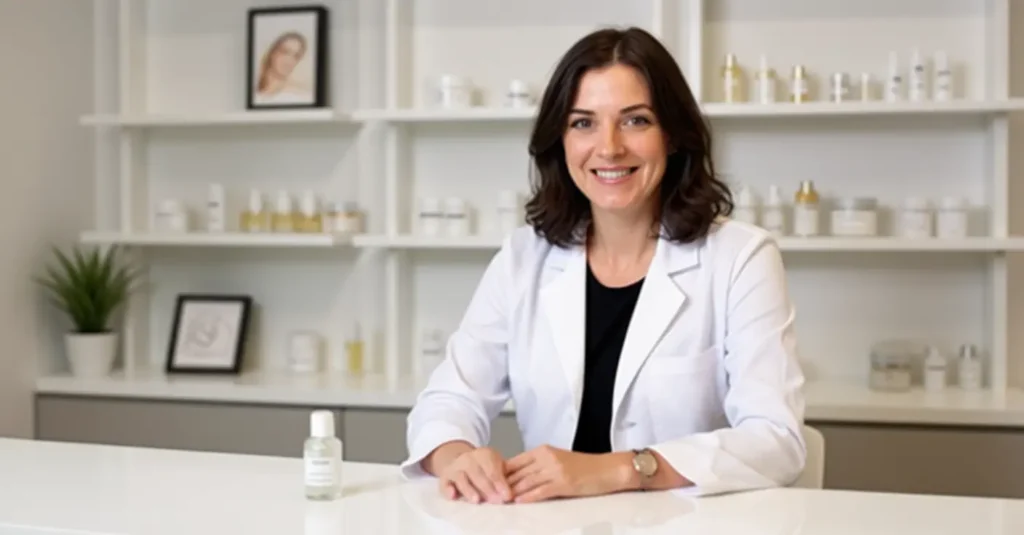
When it comes to your skin, you want the best, products that are both effective and safe. That’s where dermatologist developed skin care products come in.
These products are specially formulated and tested by skincare professionals, ensuring that they’re not only effective but also gentle and suitable for different skin types.
Let’s explore why choosing dermatologist-developed products is essential for healthy, glowing skin.
Why Choose Dermatologist-Developed Skin Care Products?
You’ve probably seen the term “dermatologist-tested” on skincare packaging, but what does that really mean? It means that the product has been created and tested by professionals who specialize in skin health.
These experts understand the complexities of our skin, and their recommendations are backed by science and research.
Dermatologist-developed products are designed with your skin’s needs in mind. Whether you have sensitive, oily, dry, or combination skin, these products are made to address specific concerns and offer safe solutions.
For example, if you have sensitive skin, a dermatologist-developed moisturizer will be free from harsh chemicals or fragrances that can cause irritation. It will also contain ingredients that help soothe and hydrate the skin, rather than strip it of its natural moisture.
How Dermatologist-Developed Products Improve Skin Health
One of the biggest advantages of dermatologist developed skin care products is that they’re backed by clinical research.
Dermatologists don’t just recommend products because they’re popular or have good marketing. They recommend products that have been shown to work through scientific testing and real-world use.
These products are often formulated to target specific skin issues, like acne, eczema, or hyper pigmentation, with ingredients that have been proven to make a difference. For example:
- Acne: Dermatologists often recommend products containing salicylic acid or benzoyl peroxide to help treat acne. These ingredients have been extensively tested and are known to reduce breakouts by cleaning out pores and preventing excess oil buildup.
- Sensitive Skin: For those with sensitive skin, dermatologist-developed products will typically be fragrance-free and gentle. Ingredients like aloe vera and chamomile are used to calm irritation and redness.
- Anti-Aging: If you’re looking for skin care products containing peptides, dermatologists often recommend these for improving skin elasticity, reducing fine lines, and boosting collagen production.
By using dermatologist-approved products, you’re ensuring that your skin is getting the best care possible, with formulations that are safe and highly effective.
Popular Dermatologist-Approved Brands
If you’re ready to invest in dermatologist-developed skin care products, here are a few popular and trusted brands to consider:
- CeraVe – Known for its gentle and effective formulas, CeraVe offers a wide range of products for different skin types. They include moisturizers, cleansers, and sunscreens that are dermatologist-tested and approved.
- Neutrogena – Another trusted brand, Neutrogena offers products for everything from acne treatment to anti-aging. Their products are backed by dermatological research and are designed for various skin concerns.
- La Roche-Posay – This brand is often recommended by dermatologists for sensitive skin. It’s known for its gentle ingredients and focus on soothing and protecting the skin.
- Eucerin – Eucerin is great for those with dry or eczema-prone skin. It offers moisturizing creams and lotions that help restore and protect the skin barrier.
These brands are just a few examples of those trusted by dermatologists to deliver safe and effective results.
By choosing dermatologist-tested products, you’re making an investment in your skin’s long-term health, and that’s something your skin will thank you for!
Recap of Key Skin Care Tips
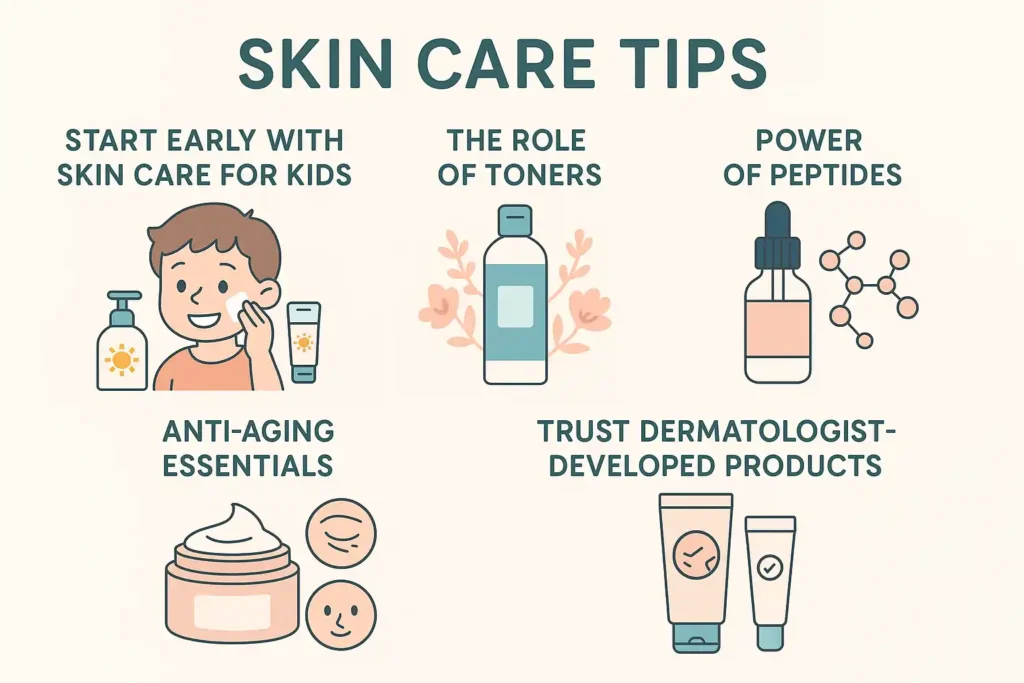
- Start Early with Skin Care for Kids: It’s important to teach kids healthy skincare habits from a young age. Using gentle, kid-friendly products like hydrating lotions and sun protection can make a huge difference in the long run.
- The Role of Toners: If you’ve been wondering what is a skin care toner, remember that toners help balance your skin’s pH, remove leftover impurities, and prepare it for the next steps in your routine.
- While not necessary for kids, toners can be helpful for teens and adults, especially those with oily or acne-prone skin.
- Power of Peptides: For those seeking to reduce signs of aging, adding skin care products containing peptides to your routine can help stimulate collagen production, improve skin texture, and reduce fine lines and wrinkles.
- Anti-Aging Essentials: If you’re aiming for an anti aging skin care routine, the key ingredients include peptides, retinol, vitamin C, and hyaluronic acid. Together, these ingredients help keep skin firm, reduce wrinkles, and restore youthful glow.
- Trust Dermatologist-Developed Products: Whether you’re dealing with sensitive skin or specific concerns like acne or aging, dermatologist developed skin care products are tested for safety and effectiveness. They’re a reliable choice for treating your skin with care.
We’d love to hear from you! What’s your favorite skin care tip? Do you have any go-to products that work wonders for you or your kids?
Drop a comment below to share your thoughts, or ask any questions you may have about skincare. We’re here to help and support you on your journey to healthy skin!
You may also like to read
The Ultimate Guide to Hair Care in 2025 (USA Edition)
